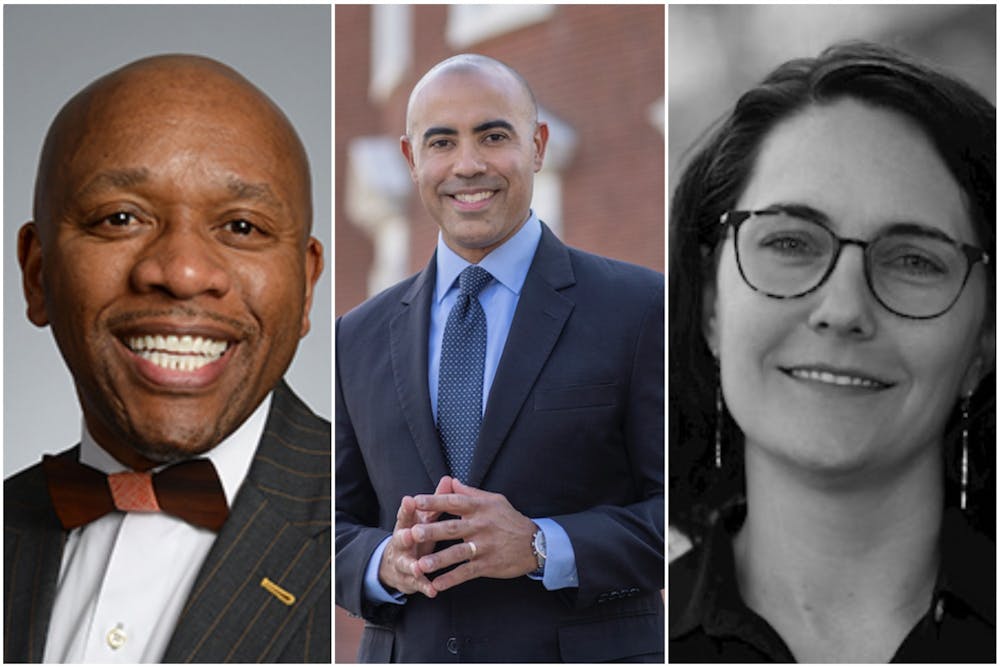The public session of the University’s Racial Equity Task Force occurred virtually Friday, over one month after a group of Black student activists and the Black Student Alliance sent separate lists of demands to the task force. The session was split into three parts — a description of their approach, an open forum — during which members of the public submitted questions displayed over Zoom — and a time for task force members to answer questions that had been submitted by participants before the session began. More than 450 people attended the event.
The University’s Racial Equity Task Force was created by President Jim Ryan June 3 with the goal of developing a concrete list of actions for the University to take to further racial equity efforts on Grounds. The task force includes Kevin McDonald, vice president for diversity, equity and inclusion; Ian Solomon, dean of the Batten School; and Barbara Wilson, an assistant professor in the School of Architecture and faculty director of the Equity Center.
The most common question from community members was a request for the task force to act on Assistant Professor Paul Harris’ tenure case, which has received national attention over the last month. Harris received a negative tenure recommendation from the Curry School Promotion and Tenure Committee after years of positive annual reviews and has spoken out about the many errors that occurred throughout his tenure confirmation process. Solomon responded that the task force was not planning to address any specific personnel cases.
“We as a task force are not going to weigh in on individual tenure cases or pending personnel matters,” Solomon said. “We very much hear this and we very much welcome ideas related to tenure policies, tenure practices, tenure goals, because I suspect we will have recommendations related to the appointment promotion, tenure and retention processes for faculty.”
There also was a large show of support for scholarships for students who are citizens of the Monacan Nation or descendents of the enslaved laborers who built the University. McDonald said that scholarships for descendants of enslaved laborers were one option the task force was considering.
“I would say that that definitely is on the table for consideration as far as recommendations,” McDonald said.
Another question, directed specifically at Solomon, described the task force as “useless and another white supremacist tool to pacify the Black community.” Solomon responded by making it clear that this was not his intention.
“I think I speak for Barbara and Kevin, that we're putting our all into giving this as honest and as thorough and as committed an effort as we can,” Solomon said.
Later on in the public session, Ben Allen, executive director at the Equity Center, asked the members a series of questions that had been sent in by participants ahead of time.
One question related to the demographics of the three task force members, pointing out the lack of any Black women. McDonald explained why the task force had decided to keep its size to three members, and how it is making a conscious effort to speak with Black women while researching its recommendations.
“We would miss an exactness with regard to keeping the task force small and nimble but [want] to be intentional about making sure we pull in those incredibly important narratives,” McDonald said. “So I'm appreciative of the team by really being intentional, being able to reach out and schedule a number of interviews already, we still have many more … we are dedicating ourselves to doing that and looking forward to the insights that we are providing through those interviews.”
Another question focused on the timeline for implementation of the task force’s findings.
Solomon said that he did not know when people could expect to see concrete effects from the task force’s recommendations but made it clear that they were committed to seeing a concrete implementation of the recommendations. Past committee processes, including the 1987 “Task Force on Afro-American Affairs” and the 2004 “President’s Commission on Diversity and Equity,” have been criticized for concluding on solutions that were never implemented.
“What I think has bedeviled some previous efforts, is there are great recommendations but not a clear what-happens-next,” Solomon said. “So we're hoping to bake that into the recommendations themselves.”
When asked to what degree historical and current student and activist voices would be elevated by the task forces, Wilson said that the task force is planning to release a website soon that would allow people to engage with this extensive source material. She said it is slated to be released within the next two weeks and would include both current voices and recommendations from the past 50 years.
At the end of the session, participants were directed towards the task force website, which will compile responses to all of the questions posed to the task force.







